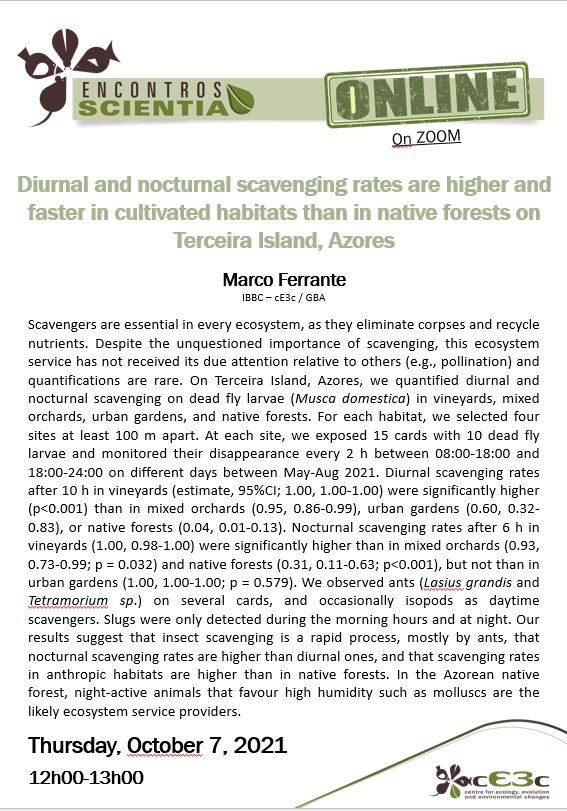Diurnal and nocturnal scavenging rates are higher and faster in cultivated habitats than in native forests on Terceira Island, Azores
Marco Ferrante (IBBC – cE3c / GBA)
Scavengers are essential in every ecosystem, as they eliminate corpses and recycle nutrients. Despite the unquestioned importance of scavenging, this ecosystem service has not received its due attention relative to others (e.g., pollination) and quantifications are rare. On Terceira Island, Azores, we quantified diurnal and nocturnal scavenging on dead fly larvae (Musca domestica) in vineyards, mixed orchards, urban gardens, and native forests. For each habitat, we selected four sites at least 100 m apart. At each site, we exposed 15 cards with 10 dead fly larvae and monitored their disappearance every 2 h between 08:00-18:00 and 18:00-24:00 on different days between May-Aug 2021. Diurnal scavenging rates after 10 h in vineyards (estimate, 95%CI; 1.00, 1.00-1.00) were significantly higher (p<0.001) than in mixed orchards (0.95, 0.86-0.99), urban gardens (0.60, 0.32-0.83), or native forests (0.04, 0.01-0.13). Nocturnal scavenging rates after 6 h in vineyards (1.00, 0.98-1.00) were significantly higher than in mixed orchards (0.93, 0.73-0.99; p = 0.032) and native forests (0.31, 0.11-0.63; p<0.001), but not than in urban gardens (1.00, 1.00-1.00; p = 0.579). We observed ants (Lasius grandis and Tetramorium sp.) on several cards, and occasionally isopods as daytime scavengers. Slugs were only detected during the morning hours and at night. Our results suggest that insect scavenging is a rapid process, mostly by ants, that nocturnal scavenging rates are higher than diurnal ones, and that scavenging rates in anthropic habitats are higher than in native forests. In the Azorean native forest, night-active animals that favour high humidity such as molluscs are the likely ecosystem service providers.
Thursday, October 7, 2021, at 12h00-13h00 (Lisbon, Portugal time)

